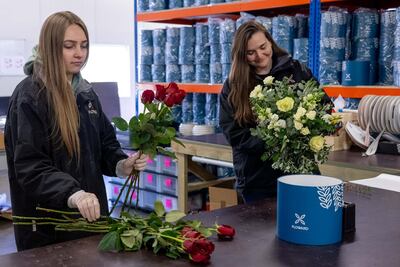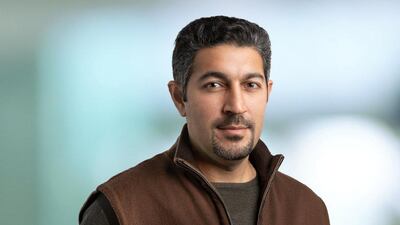Picking the UK as the first country outside the Gulf to expand his online flower delivery business was a natural step for Kuwaiti entrepreneur Abdulaziz Al Loughani.
First set up in 2017, Floward has grown into a £21.64 million ($30m) business with its annual revenue growing by 1,400 per cent between January 2020 and 2021 – when the rest of the world was battling the economic fallout from the Covid-19 pandemic – and its transactions surging 1,200 per cent.
Mr Al Loughani, who spent a year of his high school education in London and completed his master's degree in business administration in the city, expanded his venture to the UK in November last year after spotting the potential the market offered his business.
“We are going through very exciting times and rather than seeing the traditional route of countries from the West taking over this part of the world, we think we can replicate our offering with a lot of convenience to customers in the UK,” says Mr Al Loughani.
The online florist offers customers freshly cut flowers that are arranged locally and then delivered within hours.
While the company started life in Kuwait, it quickly expanded across the GCC to Saudi Arabia, the UAE, Bahrain and Qatar, before opening its UK office last year. Today it operates in 18 cities across the six countries and employs 400 people, with 21 in the UK.
Mr Al Loughani, whose close ties with Britain include visiting often with family, says he picked the UK as the first country to expand into outside the GCC because “size really matters”.
“The Gulf is a $1.5 billion market for freshly cut flowers and London, on its own, is approximately $2bn,” he says.
“Our effort is worth a lot more in bigger markets rather than small markets. So, London is actually bigger in terms of the size of the flower market than the combined Gulf.”
While the UK operation currently focuses on London, as well as parts of Greater London and Surrey – with same-day delivery available in those locations – it plans to expand to other major cities in the country in the first quarter of 2022.
“London on its own is a huge market and very established. So, we are competing with the much bigger players but we believe our product offering is very competitive,” he says.

Mr Al Loughani says the UK market is also very different from the Gulf as most companies tailor their product offering towards personal consumption, such as someone buying flowers for their home, unlike in the Gulf where the focus is on gifts and occasions.
As a result, he says Floward offers 400 products in the UK, the most of any country, with 70 per cent of its sales taken up by personal consumption – from freshly cut flowers and bouquets to vases and ribbons.
There are also gifts such as cake, chocolates and perfumes, with customers able to send a video message with their presents that the receiver can access via a QR code.
Since launching last year, the company's sales in the UK have grown 25 times between December and March, says Mr Al Loughani, with UK customers wowed by Floward’s same-day delivery service.
“When you actually offer it within the two or three-hour range, it really strikes a lot with customers in the UK,” he says.
While 90 per cent of the site’s UK customers are locally based in London, it also attracts customers from the Gulf looking to send flowers or gifts to family members based in the UK.
Unlike other marketplaces, the company arranges the flower bouquets itself at its fulfilment centre near Heathrow, where its UK staff are based, and manages the delivery to ensure customers never lose out.
Although the basic model of producing bouquets can be replicated by anyone, Mr Al Loughani says the fact that it is a full-fledged e-commerce operator – with the flowers sourced, arranged and delivered by the company – sets it apart.
“Once a customer makes a purchase, it takes us 15 minutes to prepare the arrangement. And then we dispatch it ourselves through our own last-mile refrigerated delivery fleet,” he says. “With the exception of growing the flowers, the rest of the supply chain is pretty much integrated vertically within Floward itself. So, we have full control over the customer experience, the delivery experience and customer satisfaction.”
Customer satisfaction was certainly an issue in the UK on Mother’s Day in March, when scores of consumers complained about bouquets that either never arrived or were of poor quality with wilted blooms. Poor customer service is something Mr Al Loughani is confident he will not face, with the marketing calendar tailored differently for the UK market to factor in dates such as Easter and Christmas.
A serial entrepreneur, Mr Al Loughani has an impressive CV. He is the co-founder and managing partner of venture capital firm Faith Capital and was the founding executive vice chairman of the Kuwait National Fund for SMEs Development, as well as the co-founder and managing partner of Talabat.com, a popular food delivery service in the GCC, until 2010.
The UK launch of Floward was “relatively easy” he says, because it was based on his existing business operations in the GCC.
“We have delivered a playbook to help the company roll out to new markets, whether it is the fulfilment centre requirements, infrastructure, the refrigerators, the equipment, the technology, cars – so, all the logistics,” he says.
The growth in sales has been a lot faster in the UK than in the Gulf, in terms of the number of transactions, because of the market size and opportunities in the UK.
Another factor in the company’s UK success is the Gulf’s soft spot for the UK, he says.
“They have either friends or family members studying there, working or receiving medical treatment. Many of us travel to the UK frequently throughout the year – there are cultural extensions from the Gulf into the UK, that is also a great opportunity for cross selling our products,” he says.
However, Mr Al Loughani says the UK operation is the most expensive of all his operations because of the high cost of doing business, with initial set-up costs at £150,000.
“We are committed to a long-term vision where we firmly believe that our offering and proposition is of high value for our customers,” he says. “But we have continued to burn cash every single month throughout the last six months and we will probably continue to burn cash even in the following years, with a clear path to profitability in the longer term at the end of 2022.”
Saudi Arabia is Floward’s biggest market, representing more than 50 per cent of its revenue. However, the company is now looking to expand to three more countries in the Middle East in the second half of this year, with other major UK cities on the radar early next year.
While the Covid-19 pandemic has helped rather than hindered the business because it has made people a lot more comfortable buying online, the company has experienced disruption on the delivery side.
“We had severe interruptions on the supply of goods outside of the UK for accessories such as ribbons, wrapping paper, ceramics, glass and the boxes we use for bundling flowers with other products,” says Mr Al Loughani.
“We managed to connect with some distributors in the UK to manage that interruption and the import of goods has got better over the past six months with improvements at different ports.”
The company, which has already raised $7m in Series B funding, is now looking at a new round of capital raising.
The money will help the company to expand further, boosted by what Mr Al Loughani calls his “western thinking”.
“My studies, whether it is my undergrad in the US or graduate school in the UK, have materially benefitted me from a network perspective and access to great resources,” he says.
More on start-ups in the UK
UK’s banking revolution offers insights for UAE’s digital lenders
Warning signs behind Deliveroo’s ‘disastrous’ stock market debut
FinTech matchmaker: TISAtech recruits UAE start-ups looking to expand to Britain


